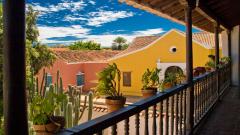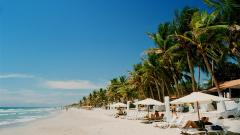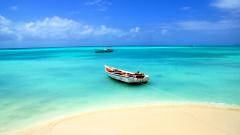 travel to Venezuela
travel to Venezuela
The Bolivarian Republic of Venezuela is in the north of South America, bordering Colombia to the west, Brazil to the south, Guyana to the east and the Caribbean Sea and the Atlantic Ocean to the north.
The territory is composed of nine regions in total, ranging from the Andes and Maracaibo Lake in the northwest, passing through Los Llanos and reaching the Guyana region. The capital of the country is Caracas, although we also highlight very important tourist cities such as Maracaibo, Merida and Trujillo.
Venezuela is a country that can boast of having a rich and ancestral culture, as well as very attractive landscape resources for international tourists. Its numerous national parks are a window towards beaches with clear and clean waters, impressive waterfalls, endless lush jungles and imperious mountains and high plains. The Canaima National Park is the most recognized in Venezuela, being added to the list of World Heritage thanks to its authentic biogeology. Also in Macarao National Park, the Morroco National Park and the Chorro el Indio National Park are places where we can make excursions to discover the wonderful natural resources that it houses. In Los Roques archipelago and Margarita Island are two of the most popular destinations in the Venezuelan sun and beach tourism sector, and where you will have the opportunity to sail by boat and enjoy its dreamy beaches.
Cultural tourism is also a valid option, since Venezuela still conserves various monuments and buildings that date back up to 500 years. Many of these elements can be seen in Caracas (see its University City), the city of Coro and its port, Colonia Tovar, Trujillo and Mérida. Its cultural heritage is quite varied and faithfully represents the culture of the Venezuelan people, as it was in the past and as it is today.
That is why Venezuela is a destination whose potential in ecotourism and adventure tourism is becoming more and more noticeable every day. The beauty of its landscapes and its wide tourist offer makes it a perfect place for the most adventurous in search of unique and unforgettable experiences.
REQUIRED DOCUMENTATION
Those people who travel for tourist reasons to Venezuela and whose stay is less than three months must submit the following documentation to enter the country:
- Passport with a minimum validity of six months.
- Round-trip ticket.
- Hotel accommodation payment certificate or an invitation letter notarized by the host.
- Copy of contract for the provision of tourist services where appropriate.
Depending on the traveller’s nationality, a visa may or may not be required. This visa is valid for one year, the traveller can stay in the country for a maximum period of 90 days, these being extendable. It is mandatory to have a visa if the stay is longer than three months.
You can see if you require a visa at the following link (in Spanish): http://www.mre.gob.ve/index.php?option=com_content&view=article&id=2143&Itemid=194
EMBASSIES AND CONSULATES: https://www.embassypages.com/venezuela
PRINCIPAL AIRPORTS OF VENEZUELA
- Maiquetía Simón Bolívar International Airport, in Caracas (Codex CCS)
- La Chinita International Airport, in Maracaibo (Codex MAR)
- Santiago Mariño Caribbean International Airport, in Porlamar-Margarita Island (Codex PMV)
- Arturo Michelena International Airport, in Valencia (Codex VLN)
- Juan Vicente Gómez International Airport, in San Antonio del Táchira (Codex SVZ)
- Manuel Carlos Piar International Airport, in Guayana City (Codex PZO)
- Alberto Carnevali Airport, in Mérida (Codex MRD)
- Juan Pablo Pérez Alfonzo International Airport, in El Vigía (Codex VIG)
- Jacinto Lara International Airport, in Barquisimeto (Codex BRM)
- General José Antonio Anzoátegui International Airport, in Barcelona (Codex BLA)
- Las Piedras Josefa Camejo International Airport, in Punto Fijo (Codex LPS)
practical information
useful information before leaving
Language
Religion
Political regime
Currency
Warnings
Documentation
Vaccines
recommendations
Recommendations before traveling to Venezuela
SECURITY
Security in Venezuela has been decreasing in recent years, relegating it to be one of the countries with the highest crime rate in the world. That is why you must exercise extreme caution if you are going to travel to that country, especially in large cities.
The main entry routes, such as the Maiquetía International Airport in Caracas, are favourite places for theft to foreign tourists. The use of taxis or other previously authorized vehicles is recommended. There are hotels very close to the airports to spend the night and avoid traveling on the road at night.
It is strongly advised to avoid attending demonstrations even though they are peaceful, since from one moment to the next it can lead to high-risk confrontations.
It is recommended to travel as much as possible in a vehicle, since at any time of the day the tourist may be the victim of a robbery. There are also assaults on vehicles, so do not make ostentation of goods of high economic value or money and keep the windows up.
There is a high risk of being abducted in areas with little traffic or at night. In case it happened, we must have a person from our environment to which the kidnappers can go to alert the corresponding consular services.
In case of robbery or kidnapping, do not offer any kind of resistance.
It is recommended to make a photocopy of your identity documents and leave the original copies safely inside the hotel or in the shelter where you stay during your stay in the capital. The original documents must be in case of traveling through the interior of the country.
HEALTH
It is advisable to take out a medical insurance that offers a wide coverage during the entire trip. Health services in Venezuela also suffer from a shortage of medical supplies and drugs, including private services.
Drink bottled mineral water and refuse to consume products that are sold in street vendors.
Citizens from Brazil are required to obtain a certificate of vaccination against yellow fever. For citizens from other countries, it is recommended that they be vaccinated both against yellow fever (depending on the area of ??the country to be visited) and against hepatitis, typhoid and tetanus. In certain rural areas near the Amazon there is a risk of malaria, so consult your doctor if you need treatment.
It is recommended to be provided with the medicines you need during your stay in Venezuela, whether for chronic treatments and more timely.
It is important to travel provided with articles of personal use and hygiene in sufficient quantities, because it is very difficult to buy them locally.
CLIMATE AND TEMPERATURES
Its situation within the continent means that it has a mostly tropical and humid climate, with its annual temperatures being quite high and at the same time constant throughout the year. In areas where the altitude is higher the temperatures are quite cold.
Certain regions of the country have a high seismic activity, in addition to suffering floods in times of rain that leave incommunicado to many areas of Venezuela. In this case, heed the indications given by the Venezuelan authorities.
BUSINESS HOURS
The hours of the shops in Venezuela usually go from 08:00 to 12:00 and in the afternoon from 14:00 to 19:00. The shopping centres extend their hours until 20:00 from Monday to Saturday.
ELECTRICITY
The electrical voltage is about 120 volts and a frequency of 60 Hz. The types of plugs used are type A and B.
TIPS
Due to the high super inflation suffered by the country, the catering sector receives fewer and fewer tips. It is usually left a 10% tip of the total bill.
TELEPHONES OF INTEREST
The phone code of the country is +58.
Some telephones that may be of interest are the following: emergencies, 112; firefighters, 080; local police, 092.
TIME ZONE
UTC-4.



